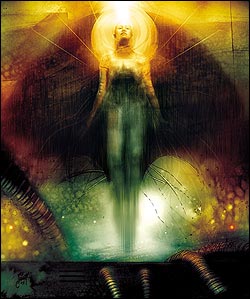Bad Faith
By David Millikan | May 04, 2007

Cosmos Magazine: Intelligent Design is an interesting variation on an old argument, but ultimately a disappointing attempt to discredit science – one that does a disservice to people of faith, argues the Reverend Dr David Millikan.
As a Uniting Church clergyman, you might think I would welcome a call to teach ‘Intelligent Design’ theory in schools, since it presupposes a guiding hand in the creation of the universe. We clergy certainly need all the help we can get! But Intelligent Design (I.D.) is both bad theology and bad science. Let me explain.
Brendan Nelson, Australia’s Minister for Education, Science and Training, has argued that schools should be allowed to teach it, later clarifying that it should be taught as part of philosophy or religion classes. U.S. President George W. Bush agrees with him, and so does Tim Hawkes, headmaster of Australia’s oldest private school, the King’s School in Sydney.
What is it that is so threatening about this suggestion that it has the scientists and science teachers up in arms? There is a beguiling simplicity about what I.D. is saying. It goes like this: the Earth is full of living things displaying complexity and order so remarkable that it makes more sense to say it was made by an intelligent creator than to say it came to be by the impersonal forces of natural selection.
I.D. has emerged in the past 15 years as something of an intellectual juggernaut. It is at its most powerful in the U.S., where there are institutes and impressive websites devoted to its advocacy. But I.D. has been around in different forms since the time of Plato and Aristotle. Its first introduction and most famous argument came from English theologian William Paley, the bookish Archbishop of Carlisle. In his Natural Theology in 1802, it became the ‘watchmaker argument’. He put it like this: if you stumbled on a watch, having never seen one before, what would you think? Here was something quite different from the world around you. Its mechanism would seem wonderfully intricate and ordered. If someone asked you: “Where did that come from?”, you would be obliged to say: “Some clever person has made this”.
This is what the supporters of I.D. are saying. Look at a single living cell and be astonished at its complexity: this surely cannot be explained by the crudities of the evolutionary theory? Such order must be the product of mind, they argue.
So why are 70,000 Australian teachers and scientists so angry about the introduction of this argument into schools that they would write an open letter? Why is the Dover School board of education in Pennsylvania defending itself in the U.S. district courts for teaching I.D.? And why are many of its opponents, including me, believers in God?
The problem lies in two places, the first being the internal consistency of the argument itself. The other problem is related to the way in which I.D. advocates are using the argument to attack contemporary scientific theory.
I.D. is susceptible to the ‘God of the gaps’ criticism. Before the work of Newton and Galileo, many Christians believed the planets were pushed around the heavens by angels. In earlier times, an eclipse of the Sun was such an aberration, whole civilisations thought could only be an act of God. In New Testament times, many people believed that epilepsy was caused by sudden assaults of evil spirits.
But as science came to understand what was happening, supernatural explanations were pushed aside. So basing an argument for the existence of God on gaps in our scientific knowledge leads to the progressive marginalisation of God, and intellectual retreat by religion.
I.D. looks suspiciously like this. It is arguing from ‘irreducible complexity’ so inexplicable that it defies contemporary understanding. But that proves nothing. It simply argues that at the moment we don’t know. It is dangerous to use God to fill the gaps because when the gaps are eventually filled by science, God is chased out.
If I.D. has this vulnerability, why don’t scientists just continue to go about their business and, in time, I.D. will be overtaken by the increase in human knowledge; which after all, is what science is about. Right?
No, the scientists who oppose I.D. see a darker purpose at work: they believe I.D. is an attack on science itself. And I am inclined to agree with them.
The advocacy of I.D. is not as innocent as it seems. It is the latest skirmish in the battle against the ‘evils of Darwinism’, one that has been fought vehemently in the United States for more than a century. But American culture differs from that of Australia and New Zealand. Sectarian passions run deep in the U.S.; evangelical and fundamentalist Christianity have never truly forgotten – nor forgiven – the way they were humiliated by the evolutionary theory. But they have been unable to dismantle it, so I.D. is an attempt to destabilise it.
According to Gallup polls, 47 per cent of Americans accept the literal account of creation in the book of Genesis. Bush holds this view too. For Christians of this hue, I.D. is just the latest missile.
David Millikan is a theologian and clergyman of the Uniting Church in Sydney, and former head of religious programs at the Australian Broadcasting Corporation.
Issue 6 of Cosmos, December 2005
http://www.cosmosmagazine.com/node/15
Image: Justin Randall















